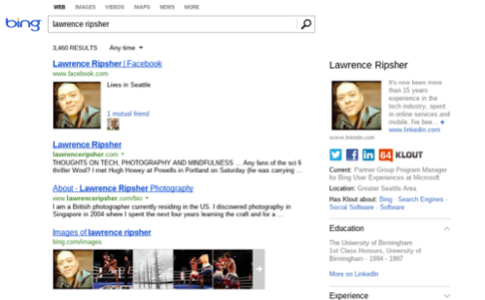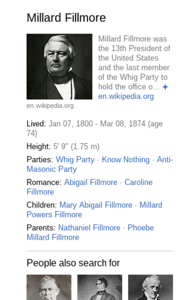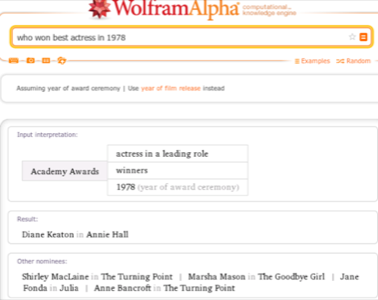
With an update on Thursday, Microsoft’s Bing is quickly becoming what could be the Web’s best source of aggregated social information. At least, when it wants to be. More on that in a moment.
Microsoft’s enhancements greatly improve the middle column of its horizontally-aligned search results, which it calls the “snapshot.” In it, Bing now provides more biographical information about celebrities. More important, however, is a detailed social profile: in one tightly-focused column, Bing links the subject’s Facebook feed, Twitter page, and LinkedIn profile; lists her title, location, and subjects of influence; her employment history, as stored in a LinkedIn public profile; and related searches.
Scrolling right then brings up the third column, or “sidebar,” which contains any social commentary you or your friends have made, including photos and posts.

Microsoft’s Quest For Satori
It’s far more information than even a user-architected Vizify or About.me profile provides. Microsoft’s Bing enhancements fall under what the company is calling satori, or understanding, aiming to provide the best answer when an answer is called for, and the most context when more nuance is required.
“At Bing, we believe that search should be more than a collection of blue links pointing to pages around the web,” Richard Qian, a part of the Bing Index team, wrote in a blog post that indirectly slammed Google. “We believe search should also be a reflection of the actual world.”
In many cases, that’s meant tapping social networks for their perspectives. In 2010, Microsoft announced its initial partnership with Facebook for search, slowly deepening the social content it could tap into over a period of months, while a social SWAT team raised its profile.
Last year, Microsoft began tapping into Klout scores, and in January, Microsoft integrated much more Facebook content into the sidebar at the right of the page. In return, Facebook’s new Graph Search defaults to Bing if it can’t find a search result.) Now, Microsoft has added LinkedIn to the fold, as well.
Who’s A Celebrity, And Who’s A Colleague?
One quirk, however, is that for right now Bing treats some individuals differently than others, which may be a bit jarring. For example, a search for “Abraham Lincoln” nets small but high-value collection of biographical content: his date of birth, death, his height, spouse, children, even his first love. As one would expect, there is no mention of any Facebook pages, Twitter feed, or online resume.

If you search for more ordinary joes, you’re apt to receive results like those described above: an index picture pulled from the subject’s LinkedIn profile, social feeds, et cetera.
It gets a little bit odd, however, when searching for someone like Facebook chief executive Mark Zuckerberg, who is treated as a celebrity. While it’s nice to know Zuck’s birthday (May 14) and how tall he is (5 feet, 9 inches) the lack of a link to his Facebook or Twitter page is a bit jarring, especially for a social media CEO. Ditto for Steve Ballmer, Microsoft’s chief executive. Fortunately, Bing has rectified that error with celebs like Ashton Kutcher, whose Twitter feed and Klout score (a whopping 87) is prominently displayed.
Microsoft representatives say that the service will improve over time, however.
“With Snapshot we want to provide people rich information at a glance that helps them better understand the world around them so they search less and do more,” a spokesman said in an email. “That said, the information will change based on the search term and may not always contain the same content. This is a long journey, and we expect to continue to deliver a number of additional improvements in the weeks and months ahead.”
Wolfram Alpha Still The Best Source of Answers
The Bing improvements also include questions and answers, the improved ability to answer a query that seeks a fact, using natural language. Type in “what is the highest mountain in the world?” to Bing, and a tidy little snapshot returns all sorts of information about Mt. Everest. Unfortunately, that excludes the Google Street View of Mt. Everest that Google recently included, but you can’t have everything.

Google may have talked up its natural language search at the recent SXSW show, but Google appears to be running a distant third in the category – possibly behind Bing, with its recent improvements, and most definitely behind Wolfram Alpha, the unquestioned leader in the category.
Type in queries like “who won the World Series in 1989,” or “who won best actress in 1965,” and both Bing and Google will return lists of links. Only Wolfram will tell you the correct answers: the Oakland Athletics, and Julie Andrews, respectively.
The vast majority of queries aren’t made by visiting the home pages of Google or Bing, but by using the search bar or a dedicated toolbar. If you really want a powerful answer engine, you owe it to yourself to visit the Wolfram Alpha download page and install the plugin or extension for all of the major browsers (except IE10). For the moment, Bing appears to be the easiest accessible source of social information, while Wolfram Alpha is the superior solution when you just want the right answer.
Lead image via Shutterstock
















